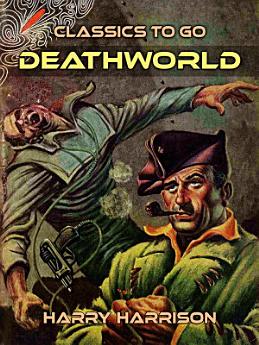Deathworld
Jun 2025 · Otbebookpublishing
Ebook
150
Pages
family_home
Eligible
info
reportRatings and reviews aren’t verified Learn More
About this ebook
In "Deathworld" by Harry Harrison, readers are transported to the perilous planet of Pyrrus, the most dangerous world in the galaxy, in this thrilling science fiction anthology. The story centers on Jason dinAlt, a skilled gambler caught in a life-altering adventure. When the enigmatic Kerk Pyrrus offers him a chance to wager a fortune to save their hostile world, Jason accepts the challenge. On Pyrrus, survival is a daily struggle against extreme gravity, volatile climate, and an aggressive ecosystem. As he maneuvers through the high-stakes environment of the casino and the deadly planet, Jason must rely on his intellect and unique skills to shift the odds. Themes of survival and human ingenuity feature prominently, as the narrative explores the relentless forces of nature. Fans of speculative fiction will find "Deathworld" a captivating tale that pushes the limits of human endurance and adaptability. This anthology offers a compelling exploration of life on other planets, making it a must-read for those who appreciate the intersection of adventure and science fiction. With its vivid portrayal of a world where danger lurks at every turn, "Deathworld" challenges readers to consider the resilience required to overcome seemingly insurmountable challenges. Whether you're drawn to tales of survival, the ingenuity of the human spirit, or the thrilling possibilities of life beyond Earth, "Deathworld" by Harry Harrison invites you to experience an unforgettable journey into the heart of a hostile universe.
About the author
Harry Harrison (1925-2012) was an American science fiction author whose career spanned over five decades, leaving an indelible mark on the genre. Born in Stamford, Connecticut, Harrison's early life was marked by a stint in the U.S. Army Air Forces during World War II, where he served as a gunnery instructor. This experience, coupled with his background in illustration and comic book writing, profoundly influenced his narrative style and thematic concerns.Harrison's literary contributions are notable for their wit, satirical edge, and often subversive take on traditional science fiction tropes. He was a vocal critic of militarism and authoritarianism, themes that permeate much of his work. His ability to blend humor with serious social commentary set him apart from many of his contemporaries, making his stories both entertaining and thought-provoking.One of Harrison's most revolutionary ideas was his exploration of ecological and environmental themes long before they became mainstream concerns. His works often depicted dystopian futures where humanity's hubris and disregard for nature led to catastrophic consequences, serving as an early warning about the perils of environmental neglect.Harrison's influence on contemporary writers is significant. Authors such as Neil Gaiman and Terry Pratchett have cited him as an inspiration, particularly praising his ability to weave complex, morally ambiguous characters into richly detailed worlds. Despite facing controversies for his outspoken views on various social issues, Harrison remained a beloved figure in the science fiction community, celebrated for his relentless pursuit of truth through fiction.In sum, Harry Harrison was a pioneering force in science fiction, whose legacy continues to resonate with readers and writers alike, reminding us of the power of speculative fiction to challenge and inspire.
Rate this ebook
Tell us what you think.
Reading information
Smartphones and tablets
Install the Google Play Books app for Android and iPad/iPhone. It syncs automatically with your account and allows you to read online or offline wherever you are.
Laptops and computers
You can listen to audiobooks purchased on Google Play using your computer's web browser.
eReaders and other devices
To read on e-ink devices like Kobo eReaders, you'll need to download a file and transfer it to your device. Follow the detailed Help Center instructions to transfer the files to supported eReaders.







